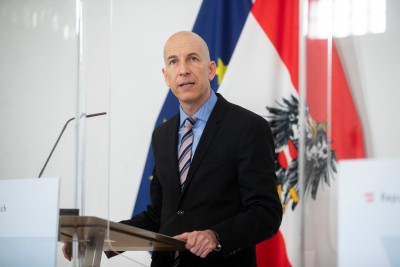Reform of the Red-White-Red Card: Facilitation for Foreign Workers
In order to cope with the acute shortage of skilled workers in Austria, access to the Austrian labour market is to be facilitated for foreign workers in the future. The application procedure is to be made easier and the criteria for obtaining the Red-White-Red Card are to be reduced.
 Austria's Labour Minister, Martin Kocher, considers the reform a step in the right direction. / Picture: © Bundeskanzleramt (BKA) / Christoper Dunker
Austria's Labour Minister, Martin Kocher, considers the reform a step in the right direction. / Picture: © Bundeskanzleramt (BKA) / Christoper Dunker
Austria is currently suffering from an acute shortage of skilled workers, which is one of the most pressing issues in the labour market. However, many of the urgently needed workers come from abroad and are confronted with major problems in obtaining a permit to work in the Austrian labour market.
In order to facilitate their access in the future, qualified workers from third countries will be able to gain easier access to the labour market in Austria through the amendment to the law on the Red-White-Red Card passed in the Labour and Social Affairs Committee.
"We are currently registering a record number of vacancies at the AMS and many companies are currently looking for skilled workers. In addition, the demographic development will further increase the shortage of skilled workers in the coming years. I am therefore particularly pleased that the reform of the Red-White-Red Card was adopted today in the Labour and Social Affairs Committee and that an important project anchored in the government programme could thus be implemented," said Minister of Labour and Economic Affairs Martin Kocher.
Important cornerstones of the reform, which also met with broad approval in the review process, are the faster processing of applications and simplified criteria for obtaining the Red-White-Red Card.
For example, the application procedure will now be made easier for persons who have not worked in the same industry throughout their professional career and who work in a profession other than the one they originally learned. The same applies to IT specialists who can work on the Austrian labour market for temporary projects.
Improvements have been made especially in tourism, care and the health sector to make it less bureaucratic to use the card and much easier to obtain the necessary points.
Administrative simplifications also contribute to speeding up the procedures. "We have dealt intensively with the conditions in the companies and exchanged views with entrepreneurs in order to facilitate the possibilities for applying for the Red-White-Red Card in the most practical way possible."
Seasonal workers who have already been employed for three years will in future have the opportunity to be employed as regular seasonal workers and subsequently receive a Red-White-Red Card.
"The Red-White-Red Card and the expansion of the regular seasonal worker regulation are important tools to facilitate access to the Austrian labour market for employees from third countries. Without the regulated influx of employees from third countries, we will not be able to solve the challenges of the shortage of skilled workers, especially in tourism," says State Secretary Susanne Kraus-Winkler.
In future, skilled workers will be able to come to Austria for projects of up to six months and will only need a visa and an employment permit without a comprehensive procedure.
"We are thus enabling companies to find suitable staff in an uncomplicated and quick manner," said the Federal Minister. "Employers can also apply for the issuance of a Red-White-Red Card to affected specialists after the end of the project."
"Qualified and practical training as well as attractive working conditions for people working in Austria are important measures against the shortage of skilled workers. However, it will not be possible to substantially alleviate the shortage of skilled labour without additional workers from abroad. Therefore, the majority in Parliament for the reform of the Red-White-Red Card is an important milestone within a comprehensive skilled labour strategy," concluded the Federal Minister.



